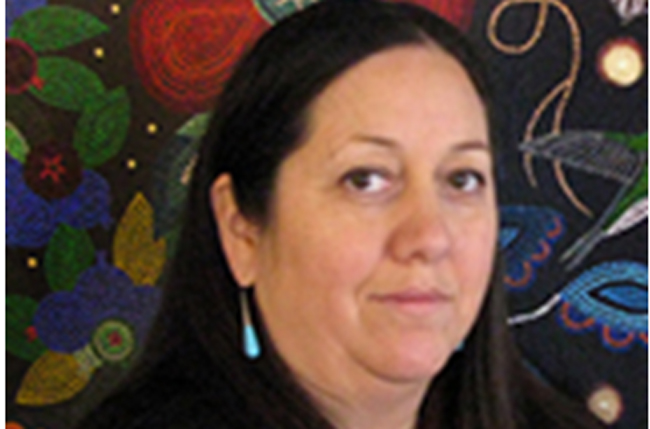Artist honoured for spearheading ‘Walking With Our Sisters’ memorial and art exhibit

SUDBURY – At the Walking With Our Sisters memorial and art exhibit, rows upon rows of beaded, woven and painted “vamps” are laid out for viewing. But their beauty belies their symbolism.
Each vamp (the upper tongue of a moccasin) represents an Indigenous woman who has gone missing or been murdered. In Canada, that totals more than 800 women. As the lives of the women remain unfinished, so do the moccasins.
The art exhibit is spearheaded by Christi Belcourt, who was honoured at the June 2 Northeast Influential Women awards luncheon for her aboriginal leadership. An Espanola-based Métis artist, an initial call for 600 pairs of vamps grew, reaching beyond provincial and national borders until the final tally reached 1,725. More than 1,300 participants from Canada, the U.S. and Europe contributed, with each pair of vamps representing a missing or murdered Indigenous woman.
The exhibit is booked to tour more than 30 locations across North America over the next six years.
Amongst the women who conduct ceremonies surrounding the exhibit, there are no titles, no hierarchies of importance. There is no delineation of participants by race, culture, language, or nation. The only requirement is a desire to help and to show compassion for their fellow human beings. Of that, no one is more cognizant than Belcourt, but the personal acclaim that’s been generated as a result of the project makes her noticeably uncomfortable.
“I don’t want to be recognized for this work that I’m doing,” Belcourt said. “Not only is it not about me, but it’s not about one person.”
Beyond Walking With Our Sisters, however, there’s no denying that Belcourt has been an influential presence— in the artistic community, as a Métis woman, and as a successful entrepreneur—as evidenced by her large, respected body of work, which spans decades.
Her paintings have been exhibited in Canada, the U.S. and Europe, and her pieces are part of permanent collections at the Indian and Inuit Art Collection in Quebec, the Gabriel Dumont Institute in Saskatchewan, the Canadian Museum of Civilization in Ottawa, and the Centre for Traditional Knowledge & Museum of Nature, also in Ottawa.
In 2011, the Government of Canada selected Belcourt’s design to commemorate the legacy of Indian residential schools and rendered it in stained glass. The window is now installed in the centre block of Parliament Hill in Ottawa.
Raised primarily in Ottawa, Belcourt’s lineage originates from Lac Ste. Anne, Alta., and includes Métis, Cree, Mohawk, English, French and Acadian provenance. Belcourt knew she would be an artist from an early age, but it wasn’t until the 1990s that she began to thoroughly explore her ancestry through her art.
Inspiration for much of her work is informed by her humanity. Despite the negative perceptions portrayed in the media, she retains an enduring belief in community and the kindness of people.
“If there’s injustice, or just a real basic sense of right and wrong, then I react to it, and that’s about as simple as it gets; it doesn’t get any more complicated than that,” Belcourt said. “Some of the works that I do, it’s mostly just from that simple place and a place of compassion for other people.”
In keeping with the guiding principles of the Walking With Our Sisters exhibit, none of the participants, organizers or volunteers will profit from the memorial. Any surplus funds will go towards the project’s partners, which benefit Aboriginal students and provide support for the families of missing and murdered Indigenous women. Belcourt’s successful career as a working artist means that she can afford to continue her advocacy as the exhibit travels the country, spreading its message.
“My art practice makes it possible, then, for me to be able to volunteer at this, because as long as the bills are paid, I can do the work that I need to do with Walking With Our Sisters.”
The Northern Ontario Influential Women of Northern Ontario Awards program will announce this year’s northeast and northwest award winners in the following categories: Executive, Entrepreneur and Young Entrepreneur, Influential Woman Essay Scholarship and three new categories: Aboriginal Leadership, Tradeswoman and Influential Community Trailblazer.
The Influential Women of Northern Ontario program was launched in 1997 in order to seek out, honour and profile women in Northern Ontario who contribute to the North’s economic success and expansion. Over 100 influential women have been recognized since the program’s inception. The roster of award winners continues to grow.


